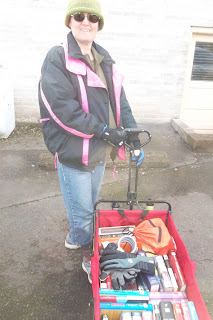On Sunday, Jonathan and I took a wagonload of books — donations for Friends of the Library — with us on a two-mile walk from our apartment to Ashland downtown.
Our thoughts during this walk focused on one overarching theme: Our choice to walk is essentially a protest against oil-pipeline construction. And talk about effective: by not driving a car to tote our wagonload of books, we’re withholding consumer demand, the absolutely underlying factor that makes oil-pipeline construction viable.
Like Jonathan pointed out among his suggested ways to apply political pressure, we live in a capitalist society and we need to use it to our advantage:
“[I]f all the people who claim to be against these environmental and social atrocities were to sell their cars and start walking, biking, and taking public transportation, the economy would fight for us. Lawmakers would have to build more bike lanes, trains, and bus routes. But we, the people, need to get off our asses and CREATE THE DEMAND for these things.”The Dakota Access Pipeline couldn’t be built if we weren’t constantly driving to get where we need to go.
In December, I logged 122 miles of trips not taken by car, into the Drive Less Connect database. According to its calculations, I withheld $35 in gas purchases from the oil/fuel industry. That might not seem like much, but what if everybody else made similar consumer choices?
To truly effect change, it’s ultimately up to us, the very people who claim we want to protect the environment. We need to change our habits, massive-scale, to create demand for greener alternatives. We need to sell our cars, stop buying fuel at the pump, and take public transportation instead. And whenever possible, we need to rely on people-powered transportation: walk, roll, push, pedal, etc.


No comments:
Post a Comment